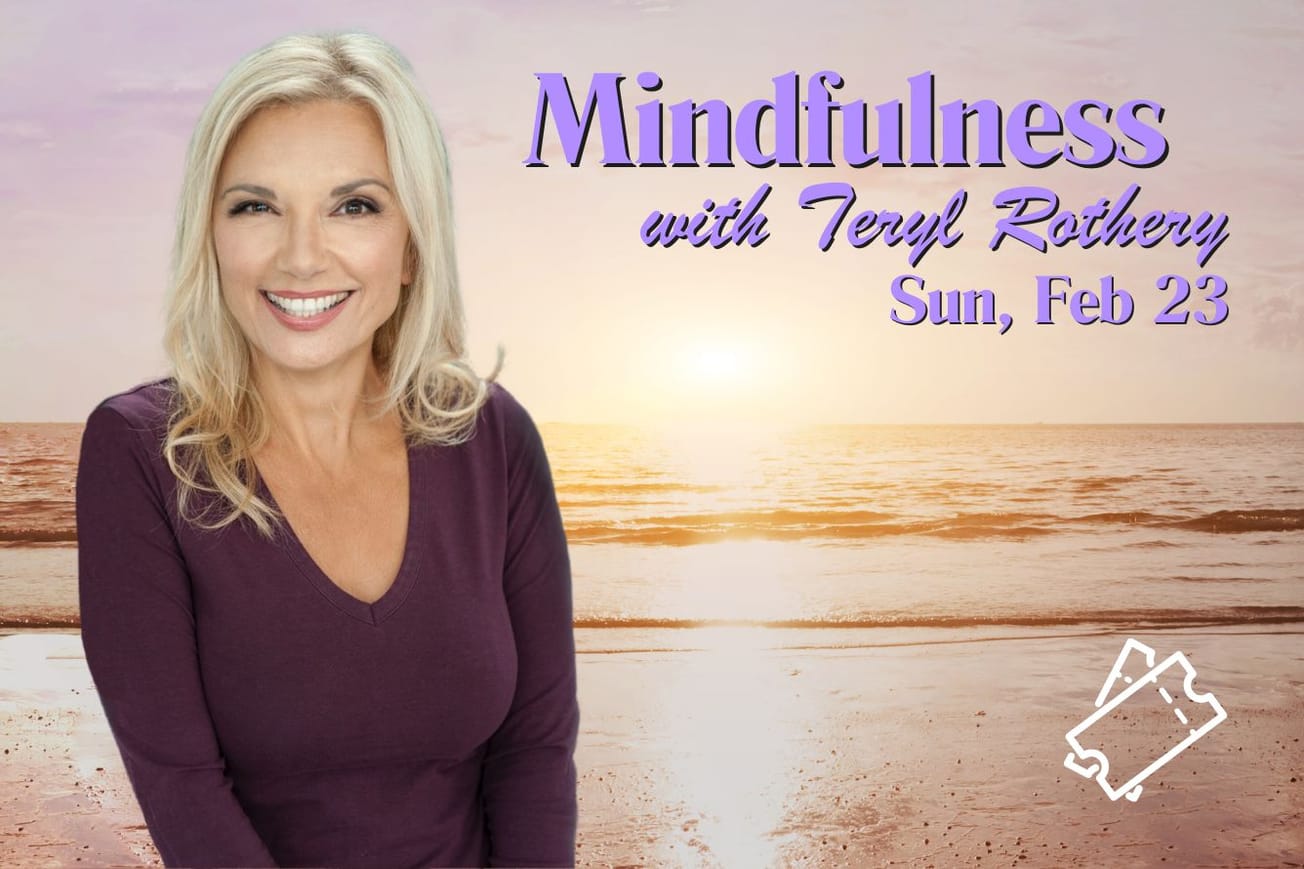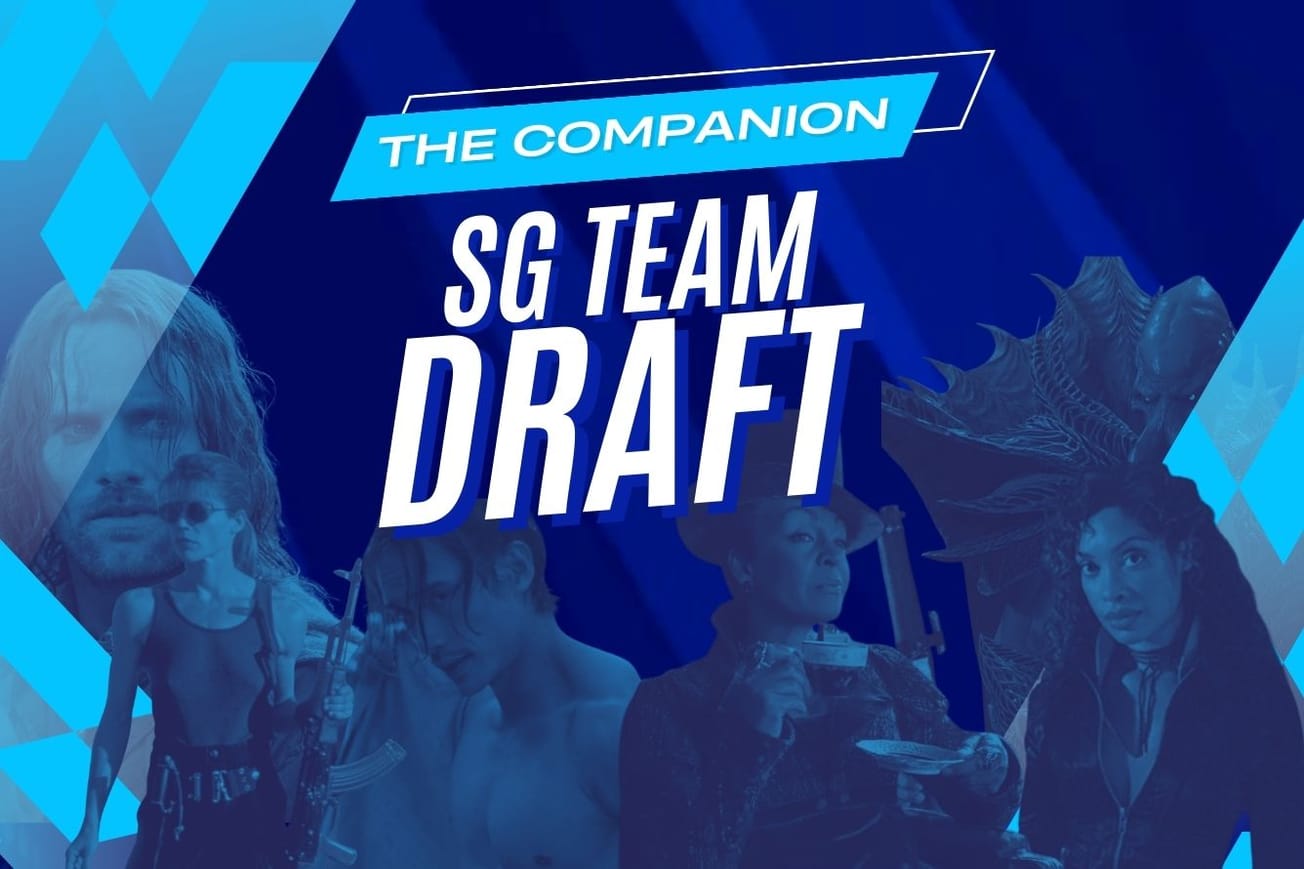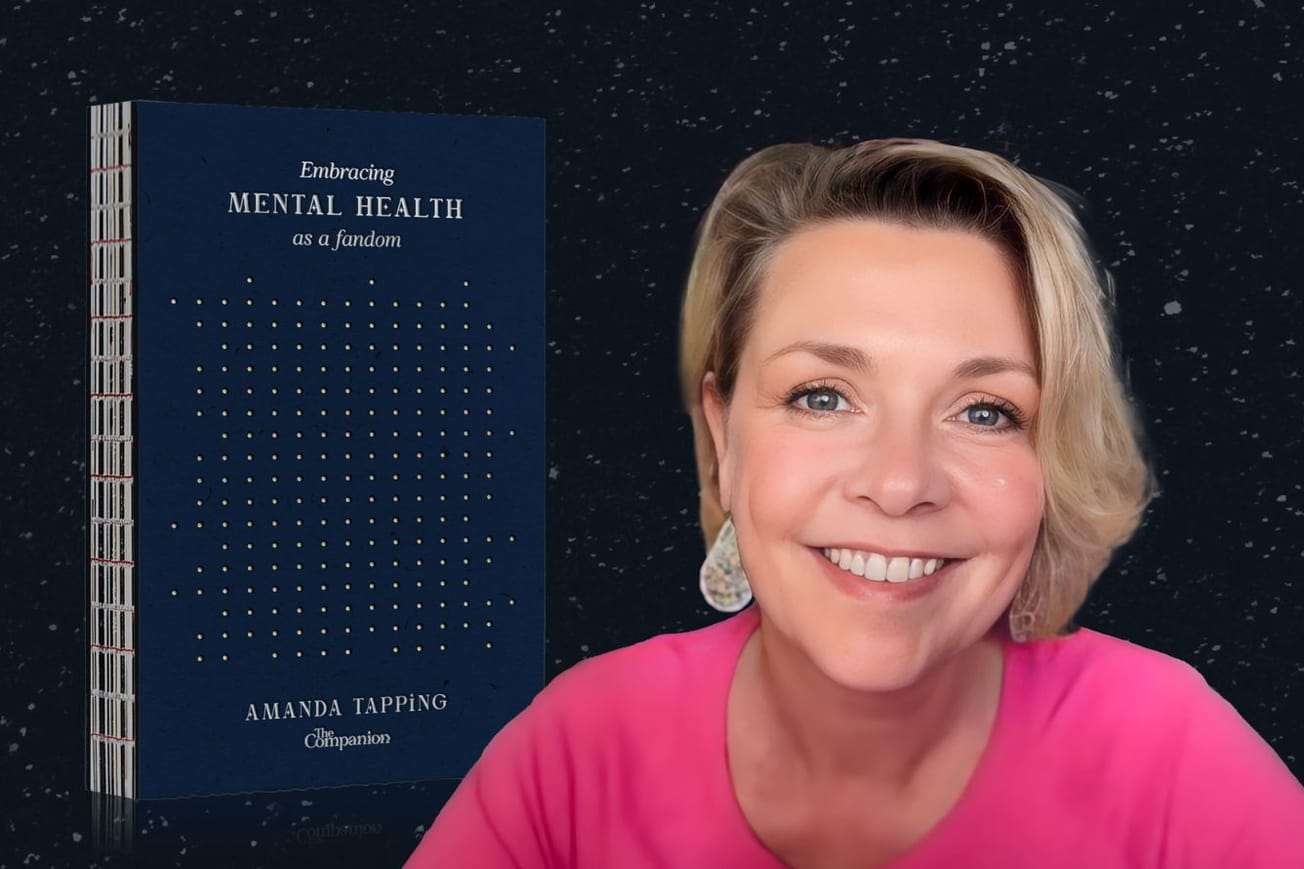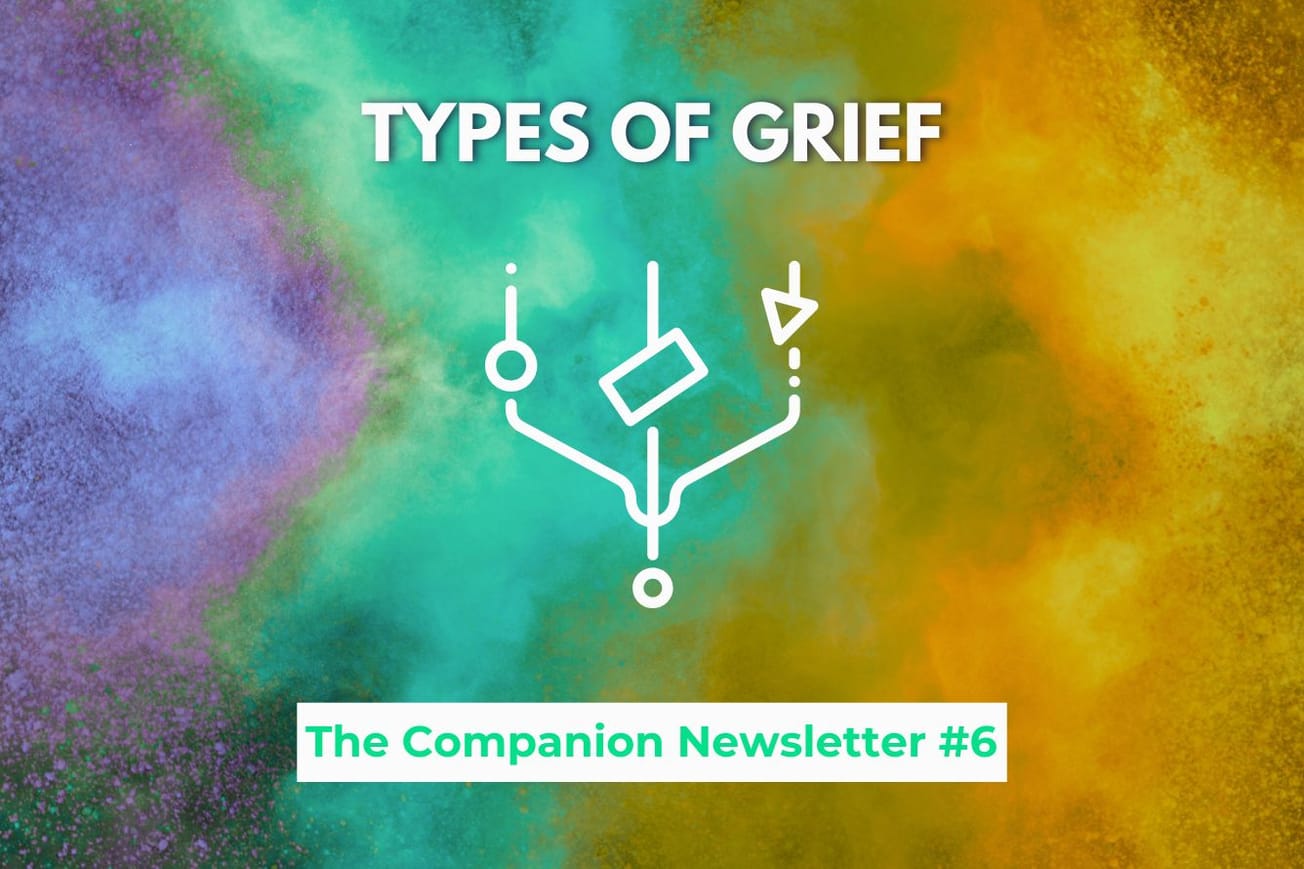We begin in a busy hospital corridor, a mundane Earth setting, and follow an elaborate Steadicam shot (laid out by director Martin Wood) up and down hallways and eventually into an operating room. There, strapped to the table, is Teal’c (Christopher Judge). But the expression on his face is a very un-Teal’c-like terror. The reverse angle discloses why: His surgeon is Apophis (Peter Williams). Teal’c suddenly awakens. Surely this was just a dream.
But wait… Teal’c is without his gold tattoo and his symbiote pouch. He is followed into the washroom by Jonas Quinn (Corin Nemec) and they surreptitiously converse. But the African-American man is called “Tee” and the white one “Probie.” And Tee is using contractions and slang. But while we’re puzzling over that Teal’c awakens yet again, this time from Kel-no-reem —but still without his symbiote pouch.

What is going on here? Is this even Stargate SG-1?
The opening credits reveal that, yes, it is, as we try to make sense of this tri-level dream. It’s said there are three types of dreams: passive imagination, dream illusions, and dream hallucinations. Teal’c would definitely appear to be suffering from the latter.
Dream episodes are perilous territory for TV episodes. Not only do they tend the signal their pseudo-subconsciousness a mile off but their allegory is always too neat and the structure unfailingly linear. What we are dealing with here is an extremely rare animal: a “dream” episode that has the disjunctive structure and elusive meaning of an actual dream. As psychologist J. Allen Hobson, paraphrased by dream scholar Kendra Cherry, believed: “Dreams tend to contain illogical content, intense emotions, acceptance of strange content, strange sensory experiences, and difficulty remembering dream content.”
The father of modern dream interpretation, Sigmund Freud, believed that they contained overt meanings (“manifest content”) and unconscious thoughts (“latent content”). Stargate SG-1’s ‘The Changeling’ (S6, Ep19) keeps us guessing which of those tracks we’re on at any given moment. By contrast, the standard dream episode hews to the theories of Carl Jung. As Understanding Dreams in Clinical Practice (2011) author, Marcus West, summarizes it: “Jung […] made his interpretation on the subjective level. Here, he says—and this is a characteristically Jungian position—that every object in the dream corresponds to an element within the individual’s own psyche.”
Teal’c’s Disorientating Journey Between Dream and Reality
We assume we are back to normal as the nominal opening scene shows Major Samantha Carter (Amanda Tapping) searching in vain for blue jello in the Stargate Command canteen. (Not only is ‘The Changeling’ written by Christopher Judge but it can also be said to show the SGC and its protagonists from Teal’c’s point of view.) Teal’c joins her and discloses that he has been unable to Kel-no-reem, prompting Carter’s recommendation of a glass of warm milk and one of the Jaffa’s most famous aphorisms.
“I would prefer not to consume bovine lactose at any temperature.”

As the camera pans around Teal’c during this seemingly ordinary conversation, he is suddenly Tee again and in a firehouse, talking to his superior, Captain Carter. The fire chief is Jack O’Neill (Richard Dean Anderson) and Probie is serving breakfast, wearing an emasculating, polka-dot apron signifying his lowly status. Before they can eat an alarm is received, as we must grapple with the allegorical meaning of Tee being a firefighter. (Even Siler is a member of the crew and the dispatcher is voiced by Gary Jones/Harriman.)
The fire engines arrive at a multi-car accident site on a bridge. Carter rushes toward the danger, overseen by O’Neill with a look of concern. (Is Teal’c/Tee wise to Sam/Jack?) Tee initially works with a frenzy but freezes when one of the victims is rolled over and it’s—again—Apophis. (Could Teal’c be experiencing guilt for his role in Apophis’ death?) He snaps back into action and rushes into the flames when a man trapped in a burning vehicle revives… and it’s Bra’tac (Tony Amendola). “Save yourself,” he commands Tee, who ignores him and is suddenly blasted backward by an explosion…
…and onto the floor of the canteen, Teal’c having swooned in mid-meal. The next thing we see is the familiar gleam of Dr. Janet Fraiser’s (Teryl Rothery) penlight, as she examines the Jaffa for abnormalities.

Dr. Janet Fraiser: Well, you seem fine now, whatever happened. Still, I’ve never heard of any Jaffa fainting before, let alone you.
Teal’c: I did not faint, Dr. Fraiser.
Samantha Carter: Sorry, Teal’c, but you did. One minute I was talking about the upcoming mission, the next minute you were lying flat on your back.
Teal’c reclines on his infirmary bed, as Dr. Fraiser’s hand draws back from his forehead, revealing that he’s Tee again, in a civilian hospital, having escaped the blast with negligible injuries. By now we know that Tee is donating a kidney to his adoptive stepfather Brae (Amendola) and experiencing some trepidation, no matter how much he insists otherwise. We also learn that Tee has a girlfriend, Shauna, played by Musetta Vander (Shan’auc in the Stargate SG-1 episode ‘Crossroads’ – S4, Ep4). Make what you will of the fact that even Teal’c’s subconscious philanders on his long-suffering wife. Meanwhile, O’Neill offers to Shauna that “I know a resident psychologist here,” whom we will shortly meet.
Tee and Brae, meanwhile, are getting into a heavy rap session about Tee’s accident. “You’re starting to scare me,” says the latter. “You should be scared,” replies Brae. “Something’s wrong.” (We’ll say!) “What is it,” asks the younger man, who now is Teal’c again, still in the infirmary.

“My mind was filled with images,” he tells Fraiser. “I was me yet I was not entirely myself.” This is disconcerting to Teal’c, whose meditations consist of ‘lucid dreaming’ that he can control. Of Teal’c disorientation, Fraiser says:
It’s not uncommon in the first moments when one wakes up to feel disoriented. Not uncommon for humans—very strange for Jaffa.
She then pulls the curtain shut to examine Teal’c symbiote, a curtain which is promptly pulled right back open to reveal Tee’s psychologist: Dr. Daniel Jackson. Not Ascended Daniel but a regular, mortal Dr. Jackson. As Joel Goldsmith’s six-note ‘Ascended’ (S5, Ep3) motif is sounded, Tee and Jackson make their introductions.
Tee: You think I’m crazy.
Dr. Daniel Jackson: No, not yet. We just met.
Tee: We haven’t met before?
Dr. Daniel Jackson: No, no, I don’t think so.
Tee: I’m sure we have.
Dr. Daniel Jackson: Well, maybe in another life or something like that.
Apophis and the Meaning of Nightmares
Alluding to Tee’s accident, Jackson says “a couple of your friends thought you might want to talk about it.” Has Ascended Daniel been in contact with Jack and Janet? Or is he simply another illusion? At this point, we have every reason to believe that the Teal’c narrative track is real life and the Tee one a dream. Whereupon Judge (and uncredited collaborator Brad Wright) throw a wrench into our assumptions, as the next thing we see is a bewildered Teal’c wandering the halls of the SGC and into the Gate Room. He follows Jack through the Stargate—and into the hallways of Tee’s hospital, still in uniform and gear as Teal’c … only to encounter Apophis in full ‘Children of the Gods’ (S1, Ep1) drag. Apophis gets right to the crux of Teal’c nightmare— which we only now realize is a nightmare.
Apophis: You are afraid to die, Teal’c …
Teal’c: No.
Apophis: …because you know I will be waiting for you in the afterlife.
Teal’c: Who are you?
Apophis: You know who I am. I am your god.
Teal’c: NO!

At this point a nurse (played by Judge’s life partner Gianna Patton) interrupts, and this time it is Tee who is lost. To reinforce the fear-of-mortality theme, an emotion Teal’c has never previously acknowledged, Tee hasn’t just wandered into any ward but a geriatric one. (Remember, his symbiote staves off aging.)
“Research has shown that those who experience greater levels of worry in their waking lives and people diagnosed with post-traumatic stress disorder (PTSD) report higher frequency and intensity of nightmares,” writes Cherry, and with years of combat weighing open him, whether as Apophis’ First Prime or a member or SG-1, doing what Jack would call “damned distasteful things,” would it be beyond the pale for Teal’c to be a PTSD sufferer, no matter how much calm he outwardly maintains?
Teal’c Faces his Mortality
Now the transitions accelerate, as Tee turns around to see Apophis, again garbed as a surgeon, who tells him, “You cannot escape your fate, shol’va.”
“According to self-organization theory, the sleeping brain’s control of physical and mental activities is weaker than in the awake brain,” reads one study. “Thus, dream elements are characterized by more freedom than mental content when an individual is awake, rendering hyper-associativity between these components possible”
As Teal’c’s level of fear increases, his nightmares begin to merge. Fleeing Apophis, he pushes through a hospital door, only to be Teal’c in the Gate Room again, greeted for the second time by O’Neill’s “You know how much it costs to keep that [wormhole] open? Brat’ac’s waitin’ for ya.” “Something is wrong,” replies Teal’c. “They must have taken it.” Breaking down into hysterics, he pulls back his uniform to reveal that his symbiote is (once again) missing. “Help me, help me,” he whispers to O’Neill.

And here—25 minutes-plus into the episode—comes the big reveal, although even afterward we are unsure if it is more of Teal’c’s manifest dream or reality. (The Tee storyline, with its unconscious substitutions, is now clearly the latent dream.) Wood’s camera tracks over the banks of a river, covered with the corpses of scores of Jaffa. At the water’s edge are two survivors, Teal’c and Brat’ac, both gravely wounded, with Teal’c passing his symbiote back and forth between the two, and saying, “Hold on, old man. Help me, help me.” Still, after everything we have seen, can we be certain that Teal’c is finally awake?
(“It’s as if something in the body is ‘stuck,’” media advisor Dr. Michelle Goldman says of dreams. “The nightmare cannot help to relieve the emotion.”)

Evidently not, for the next thing we hear is Shauna’s “It’s just a nightmare. You’re safe.” “When I’m there, this is the dream,” Tee tells her. “When I’m there, I’m part of something. Military, underground, a secret place.” (Shades of Teal’c’s role in ‘Beneath the Surface’, S4, Ep10) “They say this is the dream and when I’m there I believe it. When I’m there it makes sense that this can’t be real. When I’m here…” Tee can’t finish the thought. There’s worse to come. Brae has had the kidney transplant but his body is rejecting it.
Brae: How do we know this operation isn’t keeping me from going to a better place?
Tee: Come on, Brae! Don’t even start talking like that!
Brae: Why are we so afraid of dying? I’m not afraid.
Tee: I am! OK? I’d rather die myself than let you go! So you hang in there, old man.
Reality Intrudes on Teal’c’s Nightmare
So the scene on the battlefield was real, Bra’tac has accepted his mortality and Teal’c is coming around to the same emotion, if only because he puts Bra’tac’s life over his own. But we’re still in the “Tee” dream, as he has another appointment with Dr. Jackson. “You’ve done everything humanly possible,” he assures Tee. “I didn’t go through this so Brae could die,” Tee snaps. Jackson presses Tee to discuss his recurring nightmare. “I’m on this team. Same as the fire hall. Chief O’Neill, Captain Carter. Hell, even Probie’s there… [we] go places, try to make a difference. We help people.”
Judge has said the genesis of ‘The Changeling’ was the thought “What if Teal’c was just a man?” It’s interesting that Teal’c’s subconscious would, in looking for a haven, settle upon a humanitarian profession, especially after the intense remorse he experienced about his Jaffa past in ‘Cor-Ai’ (S1, Ep15). Dr. Jackson pounces on the mention of the symbiote: “Something like a kidney. Something you might be hesitant to give up?” Daniel urges him to reconsider the latent and manifest dreams: “Maybe neither one is real.” (As indeed they are not.)

“If the one seems equally as real as the other, maybe you don’t belong in either one,” Dr. Jackson counsels. “Then what do I do,” Tee asks. “Hang in there, just a little while longer. I haven’t left your side, Teal’c. I’m not going to. That’s a promise.” So Ascended Daniel has seen Teal’c plight and inserted himself into the intertwined dreams to lead him out because…
We immediately cut to a wounded Teal’c lying on the ramp of the Gate Room, gasping and calling for O’Neill. Even now, after all the narrative curveballs Judge, Wright and Wood have thrown us, we can’t quite be sure we’ve left the subconscious until General Hammond (Don S. Davis) enters, a significant “tell” as Hammond has not been present in any of the dream strata. It turns out that a Jaffa muster has been betrayed and ambushed, with the symbiotes torn from the pouches of all the warriors except Teal’c. He has kept himself and Bra’tac alive for three days by passing “Junior” back and forth. This has left both the Jaffa leaders and the symbiote barely clinging to life.
Reality Breaks Through
The fourth act of ‘The Changeling’ is mostly expository, hinging on Jacob Carter (Carmen Argenziano) running a mission of mercy, bringing refined tretonin (“Whoa! That’s ground Goa’uld isn’t it,” grimaces O’Neill, cutting to the chase). Jonas, meanwhile, tries to help Teal’c, while continuing to display pronounced—and well-founded, it will transpire—insecurity about his place on SG-1. “You’ve gotta hang in there,” he advises the wounded Jaffa. I need you. You made me feel like one of the team.” (This is a clapback to the first Tee/Probie scene.) “If there’s anything I can do…” – “Don’t worry about it, Probie,” replies Teal’c, employing his first-ever (and last) contraction. “Go back to sleep.”
With Junior too debilitated to heal Teal’c, tretonin is advised, against Dr. Fraiser’s objection, as she fears turning Teal’c and Bra’tac into junkies. But when Carter says “This could ultimately lead to freedom from Goa’uld oppression for all Jaffa. That’s something Teal’c and Bra’tac want more than anything,” Hammond is swayed, peremptorily ordering Fraiser to administer the drug. “Teal’c without Junior,” muses O’Neill. “That’s a concept.”

The final scene finds Teal’c back in the infirmary and Daniel—in his ascended form—at his bedside. When Teal’c tries to thank Daniel for saving him, the latter replies that the warrior did it all himself: “Every time you gave up your symbiote for Bra’tac, you knew it might be for the last time. Your mind took you where you needed to go to get through this.” And, with a final reassurance from Daniel, Teal’c sinks back into a deep—and presumably dreamless—sleep.
So we are left, thankfully, without a pat conclusion. Teal’c has confronted his fear of death and presumably overcome it, strengthening him for the trials ahead. It is he, remember, who will sacrifice decades of his life to save the rest of SG-1 in ‘Unending’ (S10, Ep20). As Cherry writes, “Another theory about dreams says that their purpose is to help us solve problems… the unconstrained, unconscious mind is free to wander its limitless potential while unburdened by the often stifling realities of the conscious world.” Which sounds very much like what Teal’c/Tee has been doing.
While he will continue to struggle to find a place in the non-Jaffa world, Teal’c’s willingness to visit his insecurities and confront them will make him a formidable leader of the free Jaffa in future seasons. And when he eventually meets his maker, we can feel confident that he will not find Apophis waiting for him after all.
The article was first published on August 31st, 2022, on the original Companion website.
The cost of your membership has allowed us to mentor new writers and allowed us to reflect the diversity of voices within fandom. None of this is possible without you. Thank you. 🙂










